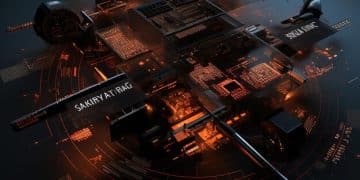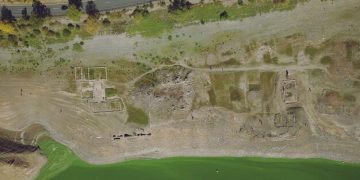US Military’s Quantum Leap: Investing in National Defense Breakthroughs

US Military’s Investment in Quantum Computing: A Breakthrough for National Defense? This article explores the strategic motivations, potential applications, and transformative impact of the US military’s accelerating embrace of quantum computing technologies.
The convergence of national security and cutting-edge technology has led to significant investments in quantum computing. The US Military’s Investment in Quantum Computing: A Breakthrough for National Defense? is prompting a reevaluation of strategic advantages. Discover how this technological frontier could reshape military capabilities, cybersecurity, and the future landscape of warfare.
Understanding the US Military’s Quantum Computing Initiative
The US military has recognized the transformative potential of quantum computing and initiated substantial investment programs to harness its capabilities. This initiative spans various branches of the armed forces, aiming to secure the nation’s defense infrastructure and gain a strategic edge over adversaries. The exploration of quantum technologies is driven by the promise of unprecedented computational power, which could revolutionize areas such as cryptography, materials science, and sensor technology.
The Strategic Imperative
Quantum computing offers the ability to solve complex problems that are currently intractable for classical computers. For the US military, this translates to breakthroughs in:
- Code Breaking: Quantum computers could potentially break modern encryption algorithms, posing a significant threat to secure communications. Conversely, they can also create new, unbreakable encryption methods.
- Advanced Simulations: Simulating complex scenarios, such as weather patterns, logistical challenges, and battlefield dynamics, with greater accuracy than ever before.
- Logistics Optimization: Enhancing supply chain management and resource allocation by solving complex optimization problems in real-time.
The military’s focused efforts within quantum computing are a direct response to the realization that this technology could redefine defense paradigms and security protocols.
How Quantum Computing Could Enhance US Military Capabilities
The applications of quantum computing within the US military sphere are diverse and far-reaching. Each potential application represents a significant leap forward in capabilities. Considering that the US Military’s Investment in Quantum Computing: A Breakthrough for National Defense? serves tangible military and strategic purposes, the initiative marks a critical evolution in defense strategy.
Next-Generation Cryptography

Quantum computers could revolutionize cryptography by enabling the development of quantum-resistant encryption methods, which would be impenetrable to classical computers and future quantum attacks. This would safeguard sensitive military communications and data.
Revolutionizing Materials Science
Quantum simulations can accurately model the behavior of molecules and materials, enabling the discovery of novel materials with enhanced properties:
- Lightweight Armor: Developing lighter yet stronger materials for protective gear and vehicles.
- High-Efficiency Energy Storage: Creating advanced batteries for military equipment and operations.
- Stealth Technology: Designing materials that can absorb or deflect radar signals, improving the stealth capabilities of aircraft and naval vessels.
The exploration of materials science via quantum computing will significantly impact the durability, efficiency, and concealment of military assets.
These are a few of the military capacities that could gain from quantum computing.
Challenges and Opportunities in Quantum Computing for National Defense
Despite the promising outlook, integrating quantum computing into national defense faces significant obstacles. Overcoming these challenges will be essential for realizing the full potential of this technology, positioning the US Military’s Investment in Quantum Computing: A Breakthrough for National Defense? as a forward-thinking and strategic endeavor.
Technical Hurdles
Quantum computers are notoriously complex and require extremely controlled environments to operate:
- Decoherence: Maintaining the delicate quantum states required for computation is challenging, due to environmental disturbances.
- Scalability: Building larger, more powerful quantum computers remains a major hurdle.
- Error Correction: Implementing effective error correction techniques is crucial for reliable quantum computation.
Workforce Development
A skilled workforce is essential for driving quantum innovation:
- Training Programs: Investing in educational programs to train scientists, engineers, and technicians in quantum technologies.
- Academia-Industry Partnerships: Fostering collaborations between universities, research institutions, and private companies to accelerate the development of quantum expertise.
Addressing both the technical and workforce challenges will pave the way for broader adoption of quantum technologies within the military.

There are still technical and logistical limitations to address before there can be a widespread implementation throughout the military sectors.
Ethical Considerations and the Future of Quantum Warfare
As quantum computing advances, ethical considerations become paramount, particularly in the context of military applications. Navigating these ethical dilemmas is crucial to ensure that the deployment of quantum technologies aligns with international norms and humanitarian principles, even if the US Military’s Investment in Quantum Computing: A Breakthrough for National Defense? continues to evolve.
Data Privacy and Security
The ability of quantum computers to break encryption poses serious challenges to data privacy:
- Safeguarding Sensitive Information: Implementing robust quantum-resistant encryption methods to protect government, military, and civilian data.
- International Cooperation: Establishing global norms and standards for responsible use of quantum technologies to prevent misuse and promote data security.
Autonomous Weapons Systems
The integration of quantum computing with autonomous weapons raises ethical concerns about accountability and control:
- Human Oversight: Ensuring that human operators retain control over critical decisions in autonomous weapons systems.
- Ethical Guidelines: Developing ethical frameworks to govern the development and deployment of autonomous weapons, addressing issues of bias, discrimination, and unintended consequences.
These aspects of quantum computing warrant special attention to ethics.
Global Landscape: Quantum Computing Efforts by Other Nations
The US is not alone in recognizing the potential of quantum computing. Many countries are investing heavily in quantum technologies, viewing them as critical for future economic and military competitiveness. Evaluating these global efforts provides insights into the strategic significance of quantum computing and underscores the need for continued innovation in the US, as the US Military’s Investment in Quantum Computing: A Breakthrough for National Defense? must be understood in the context of an international race.
China
China has made significant strides in quantum computing, with substantial investments in research and development. The country has demonstrated:
- Quantum Supremacy: Achieving quantum computational advantages over classical computers in specific tasks.
- Government Support: Backing quantum initiatives through substantial funding and strategic planning.
European Union
The EU is also investing heavily in quantum technologies, with a focus on:
- Quantum Flagship: A large-scale initiative aimed at advancing quantum research and innovation across Europe.
- Collaborative Research: Promoting collaboration between European universities, research institutions, and industry partners.
These governments see potential military applications as well as economic ones.
The Future Trajectory of Quantum Computing in the US Military
The journey of quantum computing within the US military is just beginning. As technology evolves, future applications will likely emerge, revolutionizing defense strategies and capabilities. The ongoing US Military’s Investment in Quantum Computing: A Breakthrough for National Defense? will continue to shape the trajectory of this transformative technology.
Near-Term Projections
In the coming years, we can expect to see:
- Quantum-Enhanced Sensors: Developing ultra-sensitive sensors for detecting submarines, missiles, and other threats.
- Secure Communication Networks: Deploying quantum key distribution (QKD) systems to secure military communications.
Long-Term Vision
Looking further ahead, quantum computing could enable:
- Quantum Artificial Intelligence: Creating more intelligent and autonomous systems for battlefield management and decision-making.
- Revolutionary Weapon Systems: Developing entirely new types of weapons and defense systems based on quantum principles.
The commitment of the US military to quantum computing is a proactive step towards securing its future.
| Key Aspect | Brief Description |
|---|---|
| 🛡️ Strategic Defense | Quantum computing can bolster code breaking and logistical management. |
| 🔬 Materials Science | Advanced simulations lead to innovative materials for better gear and stealth. |
| 🌐 Global Efforts | US faces competition from China and EU in quantum technology development. |
| 🔒 Ethical Concerns | Data privacy and autonomous weapons are ethical challenges in quantum warfare. |
Frequently Asked Questions
The main goal involves enhancing defense capabilities and gaining strategic advantages through quantum technology, impacting fields from cryptography to logistics.
Major hurdles include maintaining quantum states, scaling computer sizes, correcting computational errors, and building a skilled workforce to drive advancements.
Quantum computers can break current encryption algorithms, posing a threat to secure communications. However, they also facilitate quantum-resistant data encryption methods.
Data privacy and the development of autonomous weapons systems raise ethical concerns about human oversight, security maintenance, and the potential for misuse.
Other major competitors include China, known for achieving “quantum supremacy,” and the EU, which backs quantum advancements, presenting strategic implications for US Military’s Investment in Quantum Computing: A Breakthrough for National Defense?.
Conclusion
The US Military’s Investment in Quantum Computing: A Breakthrough for National Defense? signifies a transformative approach in national security strategy. While technical and ethical challenges persist, the potential gains in terms of enhanced capabilities are undeniable; this initiative marks a critical step towards ensuring future defense.





